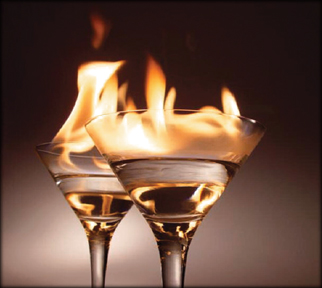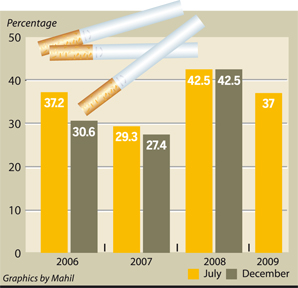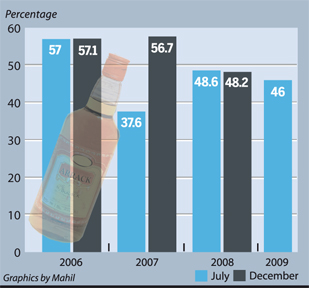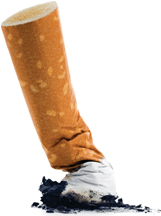Escaping horror of drugs
by Dhaneshi YATAWARA
 Let’s call him ‘Sirimal’. This nineteen year old young man is on his
revamped search for his lost life. Sirimal is stranded in life not
knowing which way to turn. His love for addictive depressants, better
known as drugs, made him lose the grip of his life. His father, a bank
officer and mother, a devoted housewife presently undergo a life-long
struggle to save ‘Sirimal’ who is receiving medication at the
‘Nawadiganthaya’ Prevention, Treatment and Rehabilitation Centre in
Nittambuwa. Let’s call him ‘Sirimal’. This nineteen year old young man is on his
revamped search for his lost life. Sirimal is stranded in life not
knowing which way to turn. His love for addictive depressants, better
known as drugs, made him lose the grip of his life. His father, a bank
officer and mother, a devoted housewife presently undergo a life-long
struggle to save ‘Sirimal’ who is receiving medication at the
‘Nawadiganthaya’ Prevention, Treatment and Rehabilitation Centre in
Nittambuwa.
There are many like Sirimal trying to escape from the deadly habit of
consuming drugs at Prevention, Treatment and Rehabilitation centres run
by the National Dangerous Drugs Control Board at ‘Sethsevana’ in
Thalangama, ‘Mithsevana’ in Galle and ‘Methsevana’ in Kandy.
World Temperance Day fell yesterday (October 3), and it is timely now
for us as responsible citizens to at least briefly review the present
situation in our country.
Majority of this group is in their budding youth. Drug addiction,
smoking and drinking inhibited the healthy growth of their life. In fact
alcohol, tobacco and drugs stand in the way of healthy growth of
society, and the negative impact on families of the users is severe. It
greatly affects the economic well-being of the people. Out of an entire
income of an average family, shockingly 2/3rd of it’s spent on alcohol,
tobacco on an average.
Threat on the young
Gone are the days when youth advertising was believed to be a waste
of financial investment on underage consumers, not legally allowed to
purchase alcohol products and who have limited purchasing power.
The adolescent stage of life is well-known to be a tumultuous time,
characterized by the often overwhelming desire ‘to fit in’. Adolescent
behaviour frequently pushes boundaries, at times endangering themselves
and others. Teenagers rarely believe that they themselves will
experience any of life’s pitfalls.
Building a strong relationship and sense of engaging with the youth
of the present equates to long term increased sales. The expansion of as
future customers replaces the original customer base that will soon
disappear from the market.
 |
|
Addicted tobacco users
Spot Survey:Alcohol & Drug Information Centre |
 |
|
Addicted alcohol users
Spot Survey:Alcohol & Drug Information Centre |
It is obvious how advertising and promotion target fun activities
such as sports and cultural events close to the hearts of the young
ones. This explains why the industry, worldwide, target sports, musical
and cultural events. By sponsoring they try to create an image that
alcohol use is fun, enjoyable, promote friendship etc. Yet, the effects
are evidently proven to be the opposite.
“Intoxicants may have symbolic and ritualistic significance and they
are widely used to provide excuses for social ineptitude, poor
performance, bad behaviour and various other kinds of failure: There are
no grounds for attributing to their pharmacological properties any
feelings of well-being or joy that may be associated with their use,”
says Dr. Hans Olav Fekjaer in his book ‘Alcohol and illicit drugs -
myths and realities’.
He further states in his book that people, in self-handicapping,
arrange circumstances in order to keep intact their self image of
competence and intelligence and objects of attribution may be used for
this purpose, notably drugs and alcohol. Intoxication is an alibi for
defective performance and unacceptable behaviour. The offender is spared
from feeling guilty and shame as the conventional view regarding an
intoxicated person is that they are unaware of what they are doing.
The pharmacological effects of intoxicants - alcohol, tobacco and
drugs - on mood and behaviour is mostly, neutral or unpleasant. Dr.
Fekjaer states in his article that experimental studies with experienced
marijuana users, who believe that they get a pleasant effect, do not get
the same ‘pleasure’ when given pure marijuana extract or
tetrahydro-cannabinol (THC) orally.
When opiates are given to medical patients or when craftsman
accidentally inhale solvents, most of the affected people regard the
psychological effects as unpleasant. The interpretation of the effects
as highly unpleasant seems to be a learnt response linked to an
intention to identify with user groups.
Studies have confirmed the adverse effect of alcohol on skill and
performance. Experts believe that several societies later copied the
unhibited drunken behaviour of colonist. In the book ‘Drunken
comportment : a social explanation’ by C. MacAndrew and R. E. Edgerton
states relating to a leading survey of anthropological research that
“over the course of socialization, people learnt about drunkness, what
their society ‘knows’ about drunkness, and...... become the living
confirmation of their society’s teachings.”
Correcting misleads
“Punishing illegal drug users does not cure their addiction,” says
Karunadasa Gamage, Director General of the National Dangerous Drugs
Control Board.
“Thus we have taken new extensive measures to correct these people
treating them as patients at our Prevention, Treatment and
Rehabilitation centres. Those who were arrested by the police and
produced before courts are directed to our centres,” Gamage
said.Treatments are mainly psychological in order to change the
attitudes of the patients thus changing behavioral patterns to that of a
productive, optimistic person.
The Drug Dependent Persons (Treatment and Rehabilitation) Act was
passed by the Parliament in 2007 thus regularizing the treatment and
rehabilitating centres spread islandwide. Any such institute must get
registered at the National Dangerous Drugs Control Board and should
adhere to the rules and regulations imposed by the regulatory
authorities.
A special attention is given to compulsory rehabilitation in this
Act. The Act states that where an Officer-in-Charge of a Police Station
receives information that any person is a habitual user of dangerous
drugs and has since become a drug dependant, the OIC should take
necessary steps to examine that person by a Government Medical Officer
and upon the report the person should be produced before a magistrate
and according to his judgement the person who is found to be a drug
dependent should be directed to a Prevention, Treatment and
Rehabilitation centre run by the National Dangerous Drugs Control Board.
Strengthening the law
 Conventions against Illicit Traffic in Narcotics Drugs and
Psychotropic Substances Act was passed in 2008 by the Parliament. It
regulates and gives permission to authorise and monitor a long list of
chemicals that are used as synthetic drug ingredients.The overall goal
of the Government in relation to the drug problem is to reduce the drug
supply and drug use, at least to the barest minimum possible. To achieve
this goal, programs such as ‘Mathata Thitha’ were launched with all drug
law enforcements directly involved in it - all responsible to meet the
objective. Conventions against Illicit Traffic in Narcotics Drugs and
Psychotropic Substances Act was passed in 2008 by the Parliament. It
regulates and gives permission to authorise and monitor a long list of
chemicals that are used as synthetic drug ingredients.The overall goal
of the Government in relation to the drug problem is to reduce the drug
supply and drug use, at least to the barest minimum possible. To achieve
this goal, programs such as ‘Mathata Thitha’ were launched with all drug
law enforcements directly involved in it - all responsible to meet the
objective.
The Government has adopted a broader approach to drug abuse control
within the context of human development, focusing particularly on the
link between drug abuse and poverty reduction, crime prevention and
improving health.
It is a strategy where supply control and demand reduction will
reinforce together.
A high sense of shared responsibility will be the norm.Yet the
intensified promotional effects by the industry have greatly obstructed
the policy measure introduced by the Governments of the developing world
controlling consumption of these intoxicants.
|

